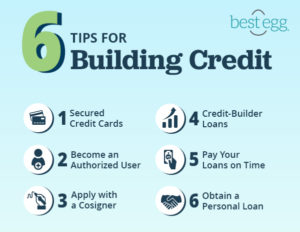

Building good credit can be a long journey, but it doesn’t have to be a stressful one. Whether you’re building your credit history from scratch or simply trying to improve your existing history, the tips you’ll find here will help you tackle this financial challenge with confidence and peace of mind.
Building Credit with a Credit Card
Credit cards are a fundamental tool in your credit-building utility belt, but you could have trouble getting approved for one with a poor or nonexistent credit history. Fret not, friend – there are a few other ways you can build credit if you don’t have your own traditional credit card, and we’re going to review them next.
Secured Credit Cards
Secured cards are similar to traditional credit cards, but they differ in one significant way – secured cards require an initial cash deposit from the cardholder during the application process. Besides this difference, using a secured credit card is the same as using any other. You will:
- receive a monthly statement that you have to pay before your due date
- have the option to carry a balance or pay your bill in full every month
- incur interest charges if you keep a balance on the card over a payment period
The initial deposit the cardholder makes has two purposes: (1) it acts as collateral on the account, and (2) it becomes the credit line for the secured card. Lenders are hesitant to give lines of credit to people with poor credit histories due to the level of risk involved, but making a deposit that doubles as your credit line eliminates this issue. Lenders aren’t concerned that you’ll be unable to pay them back because your money’s already in their account.
If you use your secured card responsibly, good news! Once you close your account, you’ll get your security deposit back. The only time lenders will keep this deposit is if you consistently fail to make payments on an outstanding balance.
You can think of a secured credit card as a bike with training wheels – once you’ve proven to lenders that you can use a credit card sensibly, the wheels can come off, and you can upgrade to a traditional unsecured card.
Become an Authorized User
A simple way to establish credit is to become an authorized user on someone else’s credit card account. There are a few pros and cons to becoming an authorized user, so you should only consider this option if someone you trust agrees to add you to their account.
First, we’ll review the pros: Becoming an authorized user allows you to spend on another person’s credit card like it’s your own and leverage their responsible financial habits to build your personal credit history. In addition, you aren’t legally responsible for paying the credit card bill every month.
Now for the cons: All activity on the account, both good and bad, can be reflected in your credit score. If the primary cardholder is missing payments or has high credit utilization, your credit could be severely impacted and take a nosedive along with theirs. It’s also worth noting that authorized users don’t have the ability to make changes to the card, like requesting an increased credit line or adding other authorized users.
Before entering an agreement like this, primary cardholders and authorized users need to have a solid understanding of the shared responsibility involved; if one person doesn’t pull their weight, the consequences to both parties’ credit profiles can be severe.
Apply with a Cosigner
Similar to becoming an authorized user, applying for a credit card with a cosigner requires consideration and a strong foundation of trust. A cosigner is someone with a good credit history that vouches to lenders on your behalf. As your cosigner, they formally agree to make payments on your balance if you’re unable to, and in return, you can use their good credit to receive a card in your own name.
If you use the card responsibly, your credit history will improve just like it would if you were using a traditional credit card. On the other hand, if you’re unable to make payments and your cosigner can’t either, both of your credit profiles may be impacted.
Many major lenders no longer allow cosigners because it’s risky to lend to someone who can’t qualify for a line of credit on their own, but Wells Fargo, Bank of America, and U.S. Bank still offer this option. Your local credit union could also be another place to check in if you’re considering building credit by applying for a card with a cosigner.

The first three tips listed detailed ways you can build credit while making use of a credit card; continue reading below to get the full scoop on how you can build credit using other financial products.
Building Credit Without a Credit Card
While using credit cards is one of the more convenient ways to build credit, other options are out there. If you’re worried about having to pay massive interest rates, unsure if you can make your monthly payments on time or concerned that you’ll be unable to use a credit card responsibly, building credit without a credit card may be the right way to go.
No credit card? No problem. Here are three ways you can build credit without using plastic.
Credit-Builder Loans
Credit-builder loans take the concept of a traditional loan and flip it on its head. When you take out a traditional loan, you apply for a certain amount, receive your money (if you’re approved), then pay back the sum in monthly installments over a given term. With a credit-builder loan, the lender doesn’t give you access to your money until the loan is paid in full, usually over a period of 6 to 24 months. These products are great options for people with a poor credit history because lenders can provide the loan with no risk on their end.
The loan terms are relatively short because the amount you can apply for typically ranges from $300 – $1,000. The idea isn’t that you’re going to be making major purchases with this sum, it’s simply a way for you to demonstrate to lenders that you’re a financially responsible borrower. Lenders will report your payment history to the major credit bureaus, so making on-time payments towards your loan is crucial if you want to build credit using this option.
Pay Your Student Loans, Auto Loans, and Mortgage Bills on Time
Making on-time payments towards your student loans, auto loans or mortgage is good for your financial well-being and can help you build credit. By abiding by the terms of your loan and paying your bills on time, you show lenders that you can manage your account responsibly and are someone who can be trusted with a loan.
Contrary to what you might think, paying installment loans off early won’t help your credit history – while it won’t hurt it either, keeping the account open and making on-time payments on the loan could benefit you more than if you were to close it. Now we’ve repeated this more than a few times, but if you take anything from this article, it should be the fact that consistently paying your bills on time is the best way to build a strong credit history.
Pro-tip: Some installment loans come with prepayment penalties if you pay it off early, because lenders make money off of the interest payments you make on the loan. Paying a loan off early cuts into that revenue, so some lenders use these prepayment penalties to recoup their losses.
Obtain a Personal Loan
Like other installment loans, personal loans provide a convenient way for you to build credit. With that said, if you don’t have a lengthy credit history or your credit score is below 580, chances are slim that you’ll be approved for most personal loans. There are lenders that consider applications from borrowers with sub-prime credit, but you’ll likely have incredibly high-interest rates on the money you borrow if you’re approved.
For these reasons, taking out a personal loan may be an option you consider pursuing after you’ve built your credit history using some of the other tips we’ve listed in this resource article. Once your credit history is strong enough to get you approved for personal loans with competitive interest rates, you’ll be able to build credit without spending a ton on interest charges.
To learn more about credit, it’s many uses and why it’s important, take a look at our robust resource section “Understanding Credit”.
This article is for educational purposes only and is not intended to provide financial, tax or legal advice. You should consult a professional for specific advice. Best Egg is not responsible for the information contained in third-party sites cited or hyperlinked in this article. Best Egg is not responsible for, and does not provide or endorse third party products, services or other third-party content.